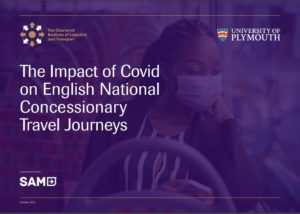Concessionary travel down by up to a third – report
A report has found concessionary travel has dropped by up to a third between 2019 and 2022 in England.
Entitled ‘The Impact of Covid on English National Concessionary Travel Journeys’, the study was compiled by the Chartered Institute of Logistics and Transport UK (CILT UK) and the University of Plymouth, through the university spinout company Smart Applications Management. It found that across England the average number of journeys per active card had fallen to an average of 48 single journeys per year. This included a reduction in the number of journeys by elderly passholders of 38% and disabled passholders by 28%, while the total journeys by male and female passholders reduced by 32% and 36% respectively.
The age group with the largest reduction in average trips was those over 80 years old, with male passholders making 43% fewer journeys per active card, and female passholders making 46% fewer journeys.
To assess the changes in ENCTS use, this report compared usage for the full calendar years of 2019 and 2022, two periods outside of any Covid-19 restrictions.
“Its confirmation that, since Covid-19, concessionary travel is down across England is a concerning one” – Dr Andrew Seedhouse, Director of Transport in the University of Plymouth’s School of Geography, Earth and Environmental Sciences
Dr Andrew Seedhouse, Director of Transport in the University of Plymouth’s School of Geography, Earth and Environmental Sciences, is the report’s lead author. He said: “Taking public transport can be more than just a journey. It can help people maintain contact, and avoid loneliness and isolation. Our motivation behind carrying out this research was to understand better how we can encourage people to get back into using the bus for social journeys. Its confirmation that, since Covid-19, concessionary travel is down across England is a concerning one.”
In their conclusions, the authors highlighted that the timeframes coincided with the number of live bus services reducing by around 10% during 2022, and a time when more people started using online shopping services. They also referenced a government marketing campaign, which ran during the pandemic and advised people not to use the bus on safety grounds. This, they said, could still be resulting in a reluctance to use services given that many ENCTS passholders are more vulnerable than other residents.
“While we acknowledge that there are fewer services, we do not believe that is the sole reason for such a dramatic decrease in concessionary travel” – Dr Seedhouse
Dr Seedhouse said: “These are just some examples of the many factors that could have influenced the change in ENCTS use within England. While we acknowledge that there are fewer services, we do not believe that is the sole reason for such a dramatic decrease in concessionary travel, with journeys down more than a third. It is particularly concerning to see that there has been an even greater reduction in female journeys within this demographic. All of this data should be reviewed by policy makers and we should work together to help encourage people to start using public transport again.”
- The full report can be read here.